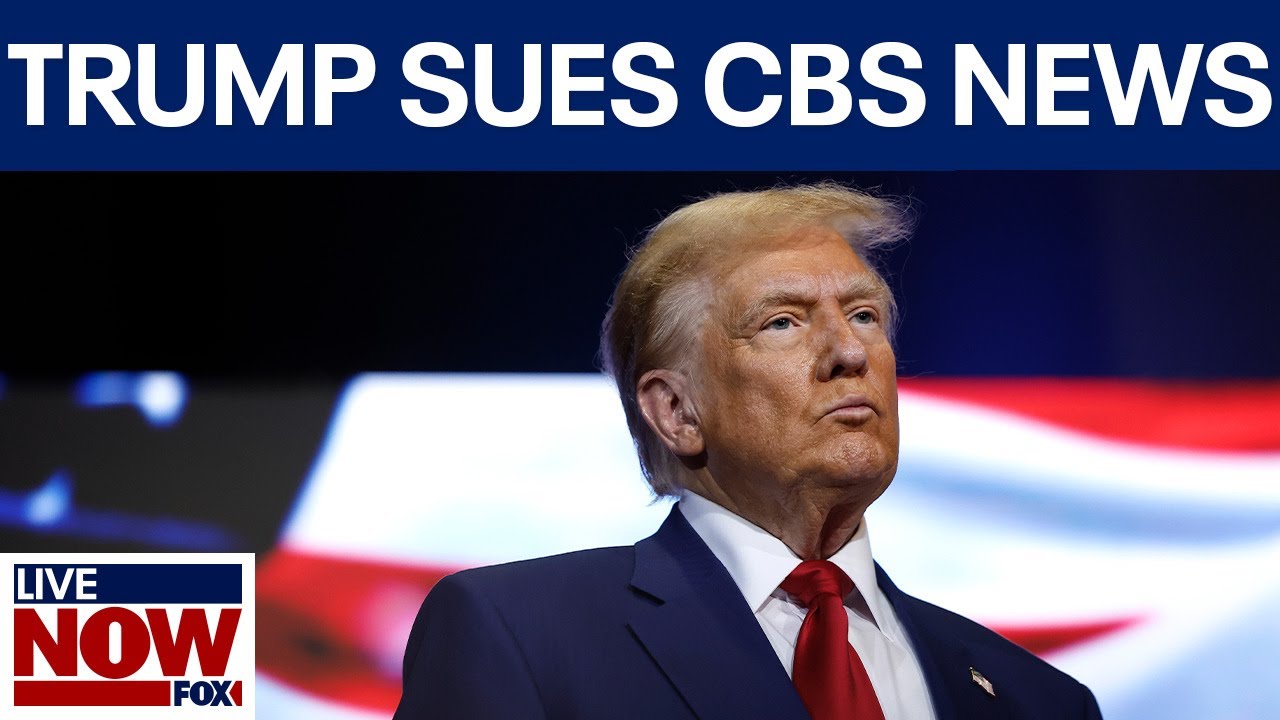- Home
- World News
- Trump Sues CBS News for Defamation: Demands $10 Billion Over Alleged Misrepresentation in Harris Interview

Trump Sues CBS News for Defamation: Demands $10 Billion Over Alleged Misrepresentation in Harris Interview
Former President Donald Trump has launched a $10 billion defamation lawsuit against CBS News, claiming that the network misrepresented his views during an interview with Vice President Kamala Harris. Trump alleges that CBS News presented information in a way that was not only misleading but damaging to his reputation, framing his comments out of context in a segment aired by CBS’s LiveNOW from FOX
Background of the Case
The lawsuit centers around a CBS News segment that covered an interview with Vice President Kamala Harris, during which the discussion touched on some of Trump’s policies and public statements. According to Trump’s legal team, CBS allegedly misrepresented Trump’s stance on several issues, suggesting that he was out of touch with the priorities of the American people and amplifying a narrative they claim was intended to damage his reputation.
In his legal filing, Trump contends that CBS News engaged in what his lawyers describe as “reckless disregard for the truth.” The claim centers around accusations of selective editing, which his team argues was an intentional attempt to harm his public image and influence public perception. Trump’s lawyers further state that this misrepresentation has harmed Trump’s prospects in his ongoing political and business ventures, leading to the substantial figure requested in damages.
Defamation Claims: Analyzing the Allegations
Defamation cases hinge on several critical factors: a statement must be proven to be false, damaging, and made with negligence or malice. Trump’s team argues that CBS News’s presentation of his comments meets all these criteria, alleging that the network knowingly misrepresented facts about his policies and intentions. They argue that the segment intentionally portrayed Trump as an extremist on certain policy issues, potentially swaying public opinion against him.
Furthermore, Trump’s legal team contends that CBS’s actions demonstrate “actual malice” — an essential element in defamation claims involving public figures. To meet the legal standard for actual malice, Trump’s attorneys must show that CBS either knew the information was false or acted with reckless disregard for the truth. By framing his comments and policies in what Trump’s team asserts was a misleading way, they argue that CBS crossed this threshold.
CBS News’s Response and Legal Implications
As of now, CBS News has yet to issue a public response to the lawsuit. Legal experts predict that CBS will likely contest the lawsuit by arguing that their reporting was based on legitimate editorial decisions and interpretations of Trump’s public statements. They may argue that as a public figure, Trump is subject to a higher level of scrutiny and that CBS News’s coverage falls within the bounds of journalistic freedom and public interest.
For CBS, the lawsuit represents a significant legal challenge. If the network loses, it could have a chilling effect on journalistic freedom, making media outlets wary of discussing public figures for fear of similar lawsuits. Alternatively, a win for CBS could solidify protections for the press, particularly regarding coverage of political figures.
The Broader Implications for Media and Politics
This lawsuit speaks to a broader conversation around the media’s role in shaping public perceptions of political figures. Trump’s lawsuit highlights the growing tension between media freedom and the public figure’s right to protect their reputation. It reflects the polarized media landscape, where former President Trump has often accused mainstream outlets of bias and misleading coverage.
The lawsuit also comes at a critical moment as Trump continues to be a highly visible figure in American politics. By taking legal action against CBS News, Trump underscores his commitment to challenging narratives he views as harmful or untrue. This case could serve as a precedent for future disputes between public figures and media outlets.
What’s Next?
As the lawsuit unfolds, the case will likely attract widespread media coverage, with implications for both the media industry and the public’s understanding of defamation laws. While Trump’s team will aim to prove that CBS News acted with intent to harm, CBS will likely defend its editorial freedom, setting up a complex legal battle.
The outcome of this lawsuit could reshape media accountability and define new boundaries for reporting on public figures. If successful, Trump’s suit may embolden other public figures to pursue similar claims. On the other hand, a loss for Trump could reaffirm the media’s right to critical reporting without fear of reprisal.
Final Thoughts
Trump’s $10 billion lawsuit against CBS News is not only a significant legal action but also a reflection of his ongoing friction with mainstream media outlets. The case underscores the delicate balance between media freedom and the responsibilities that come with it, especially in an era where misinformation and polarized viewpoints are common. As the legal proceedings progress, they will provide a valuable lens through which to examine the future of media, politics, and the power dynamics between public figures and the press.
